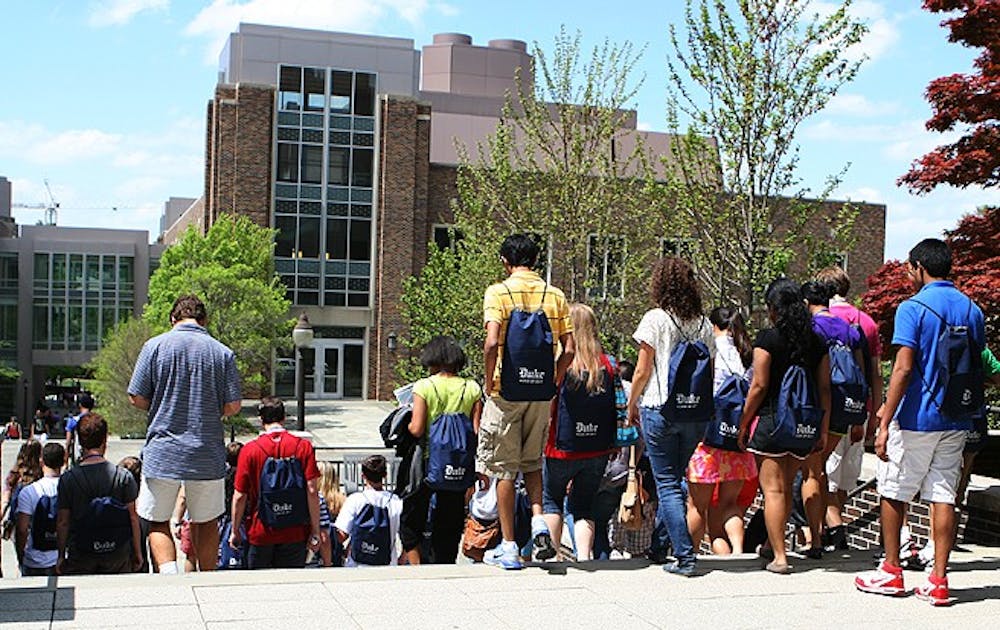In the weeks since the death of George Floyd, many Duke clubs and social organizations have spoken out in solidarity with and support of the Black Lives Matter movement.
Others have gone further and engaged their members in the fight for racial justice, in ways ranging from a benefit concert to a letter-writing campaign.
Small Town Records, a student-run record label and one of Duke University Union’s 17 committees, hosted a virtual benefit concert the evening of June 6. According to a flyer posted on the label’s Instagram account, the intentions of the concert were to educate viewers, encourage donations to various organizations relevant to the Black Lives Matter Movement and affirm the importance of Black culture in the music industry.
The concert featured current STR artists and alumni and focused largely on highlighting Black musicians. Junior Alexa Burnston, executive vice president of STR, said the concert reached more than 100 viewers.
Burnston explained that artists played 10-to-20-minute sets, during which they were asked to encourage viewers to donate to organizations related to the Black Lives Matter movement. Two members of the STR executive team also talked to the audience about ways to take action.
Burnston emphasized that STR plans to continue to find ways to actively engage in the Black Lives Matter movement.
“This is not just a one-time thing. We’re really looking to continue these conversations. As STR as a whole, we want to make sure that we’re really affirming how important black voices have been in the music industry and how important they’ve been in the history of [STR] as well,” Burnston said.
Several social organizations on campus have also taken action.
The selective living group Round Table set a goal as an organization to send 500 emails and letters to politicians advocating for various goals of the Black Lives Matter movement and submit 70 unique donations to relevant organizations, including the NAACP Legal Defense Fund and Campaign Zero, according to Co-President Ethan Wu, a junior.
The group’s efforts are tracked by an online Accountability Counter; as of June 14, they’d sent 529 letters and emails and made 78 donations. The group also donated the remainder of their spring semester dues to Campaign Zero and The Bail Project, Wu wrote in an email to The Chronicle.
Wu wrote that Round Table members decided to take action because they felt a responsibility to do so.
“Round Table is a predominantly white/Asian SLG at a private University. So, it’s important for us to recognize our own privileges and actively play a role in combating racism against Black communities. Beyond the organization, however, we believe this to be a question of human rights and basic dignity, not a political stance. Every individual should deeply care about this, so we only hope we can promote that activism amongst our members,” he wrote.
Wu also wrote that the group’s actions have been coupled with internal discussions on how the organization itself should change to better promote anti-racism.
“Selective organizations such as Round Table and Greek Life inherently do create pockets of similarly minded and, frankly, less diverse individuals. As long as this system remains static, we will be a part of perpetuating that,” he wrote.
“We hope that by actively working to change our culture, we simultaneously participate in changing the culture of the wider Duke community. This will be a learning process, which is why I think all of our organizations must seek out the very voices we internally lack in these dialogues to introduce the perspectives needed to accomplish meaningful change,” he continued.
Wu wrote that Round Table leadership plans to propose a constitutional amendment making implicit bias training mandatory for all members.
One student formed a new organization to encourage student engagement in the Black Lives Matter movement.
Senior Sydney McKinney decided to start the Duke Anti-Racism Book Club, or ARBC, after her friends asked her how they could help the movement. When they got excited about a reading list she sent them that would help them learn more about white privilege and racism in the United States, she realized that the larger Duke community might benefit from a book club dedicated to those topics.
The organization’s Instagram account, with its first post from McKinney May 31, has more than 1,200 followers. The current book of the month is “How to be an Antiracist” by Ibram X. Kendi.
McKinney wrote in an email that she picked Kendi’s book because she felt it would be a “good baseline or starting point for the mission of the book club.”
Get The Chronicle straight to your inbox
Sign up for our weekly newsletter. Cancel at any time.
“It’s a book where I feel like, even if readers only participate for one month, they can really gain important perspective,” she wrote.
McKinney plans to continue the ARBC as an on-campus club in the fall, and she hopes to work with Durham Public Schools in the near future. She expressed that although running the book club has been overwhelming at times, not to mention time consuming, she has been very impressed by Duke students’ willingness to participate.
“I think I just touched on a need that many Duke students had to do something. People wanted to feel like they had a safe space to learn and ask questions about racism, and I think I've created that,” she wrote.
Correction: An earlier version of this article incorrectly referred to Alexa Burnston as vice president of artists and repertoire for Small Town Records, a former title. It has been updated to reflect that she is executive vice president. The Chronicle regrets the error.

Anna Zolotor is a Trinity senior and recruitment chair for The Chronicle's 118th volume. She was previously news editor for Volume 117.

